
SEO is the most dynamic facet of digital marketing. Nothing is every quite where you left it and Google is constantly changing and moving the goalposts. So, how can you stay on top of the most important SEO ranking factors in 2022?
In this guide, we’ll look at the most important SEO ranking factors and how you can use this knowledge to improve your rankings in Google.
Why Your SEO Matters
Everyone wants their website to rank well in Google’s search results. And it’s no wonder the top position is the most coveted – Google is by far the most popular search engine, and the website positioned number one in Google search results experience the highest click-through rates from search queries. On average, sites at the top of Google receive a click-through rate of 34.6%. As the most sought-after position in Google search, Google works hard to ensure that users are being served the most valuable and insightful information.
But the big question is, how do websites get to the top of search results – what are the most important SEO ranking factors to consider?
Google relies on an intricate and sophisticated algorithm to retrieve data from its search index and deliver the best possible results for each search query. The Google search ranking algorithm relies on an abundance of ranking signals and algorithmic equations to present webpages ranked by relevance on its search engine result pages.
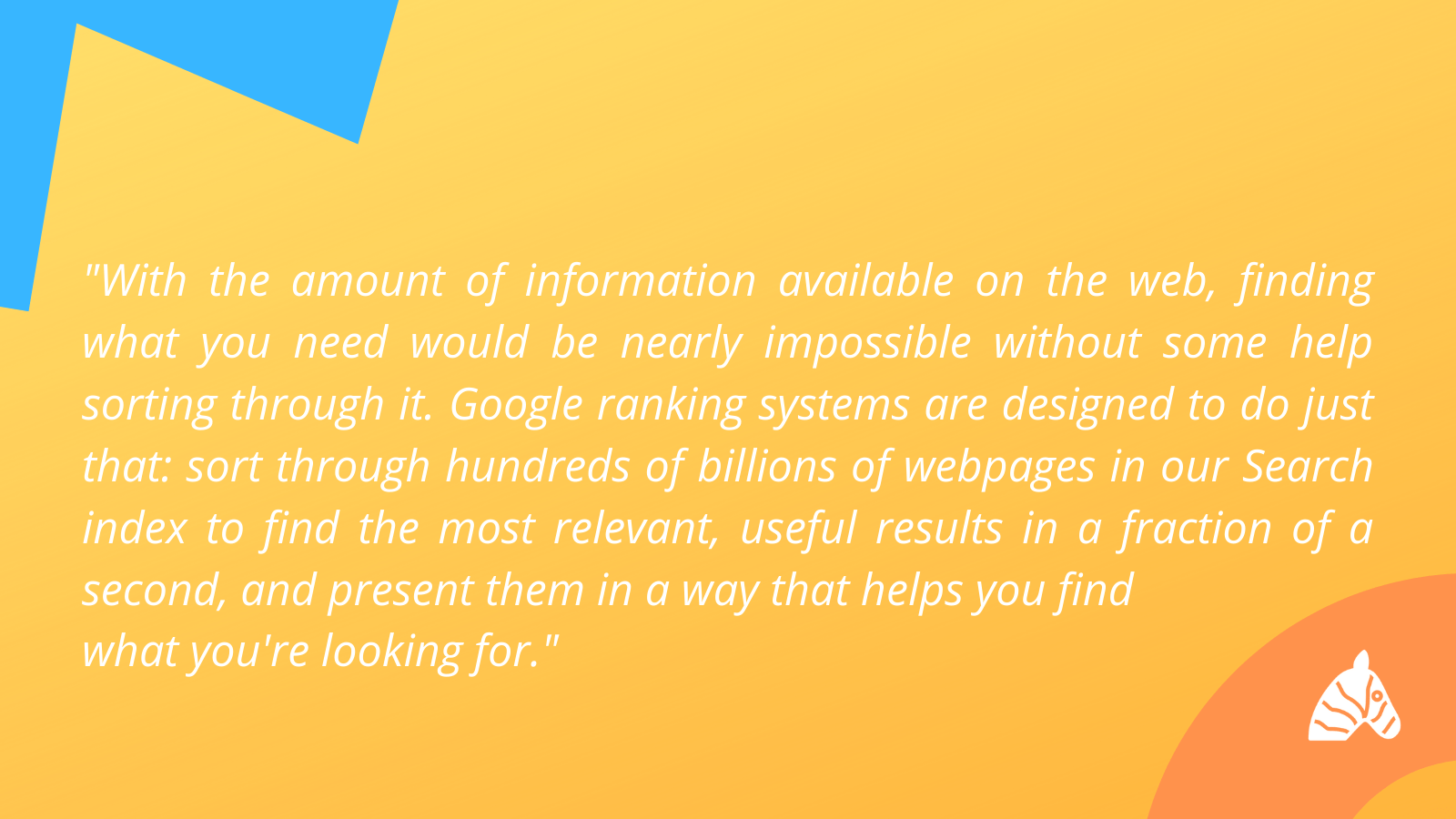
“With the amount of information available on the web, finding what you need would be nearly impossible without some help sorting through it. Google ranking systems are designed to do just that: sort through hundreds of billions of webpages in our Search index to find the most relevant, useful results in a fraction of a second, and present them in a way that helps you find what you’re looking for.”
What Are Google Ranking Factors?
Google aims to crawl, read, understand and index every webpage to add into their ever-growing index that is the internet. Google then sorts and ranks the relevance of each webpage, based upon a myriad of algorithmic factors. These Google ranking factors will be used to determine where a page is relevant, who it is relevant to, and how it compares to other pages that are relevant to the same search terms and queries.
Google’s ranking algorithm, aptly named PageRank after one of the founders Larry Page, has never been publicly disclosed. Full transparency of organic search rankings would mean that they wouldn’t be able to charge for their Google AdWords platform, which generated a revenue of a whopping 134.81 billion US dollars in 2019. As such, marketers have long been speculating the many search ranking factors that determine the secretive Google Ranking Algorithm.
The organic search algorithm is frequently updated and changed to continue to provide better results to users. As such, the SEO ranking factors used in Google’s ranking algorithm are continuously being adapted and changed. Today, we understand there are more than 200 SEO ranking factors that go into determining where a website will sit in search results. But which are the most important in 2022?
Search Engine Ranking Factors
There are more than 200 ranking factors that search engines rely on to determine how a page performs in search engine results. While we do not understand the exact ranking equations, multiple studies have been conducted to break down the most significant relevancy signals.
In 2022, we understand that there is more value placed on high-quality websites than ever before. The top SEO ranking factors in 2022 to consider are:
• Quality Content
• Backlink Profiles
• Content Freshness
• Mobile Usability
• Website Security
• User Experience
• Schema Markup
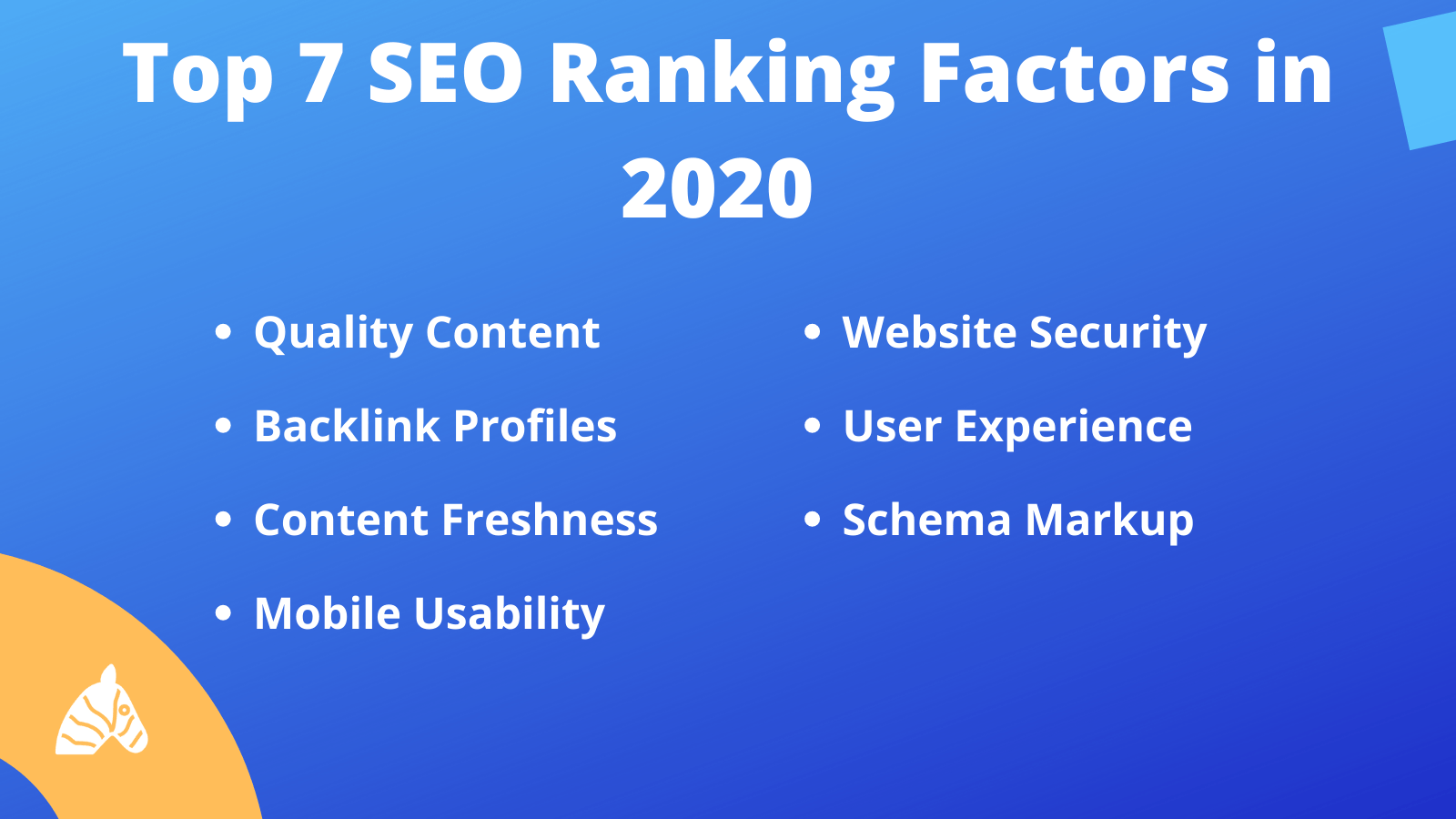
With an emphasis on quality, these are our top SEO ranking factors for this year. For the purpose of going on a bit of a deep dive into the 200+ Google ranking factors, this article will also break down what we do know about Google’s ranking algorithm in 2022.
Below we’ve compiled a comprehensive list of Google algorithm ranking factors we believe to be relevant. All have been backed by relevant research, and the search engine giant itself has confirmed many. So, buckle up and get to know Google’s algorithm on a more intimate level:
Core SEO Ranking Factors
1. Site Architecture
The more enhanced your site architecture, the better your chances are of performing well in search engine results. Search engines need to access and crawl your site to determine what it is about, where it is relevant, and how valuable the content is. By optimising your site architecture, you’re improving the accessibility and crawlability of your pages. Enhancing your site architecture will make for better indexing of pages, increased visibility and improved user experience.
2. SSL Certificate
Having your site safe and secure will improve your organic search engine rankings. HTTPS has been a signal in Google’s ranking algorithm since 2014, and Google will only continue to move towards a fully secure web in the future. Furthermore, Chrome actively labels HTTP sites as insecure, warning users against using the connection.
3. Server Location
It has long been suspected that the location of a server may signal to search engines the relevancy of a website to their target country and audience. Search engines use this information to better understand who the content is most relevant to and include the pages in the server’s country search results.
4. Schema Markup
Schema Markup is code that is placed on a site to aid the search engines to return more information from your content to users. Schema tags will improve the way that search engines read and represent your page in the SERPs, which can, in turn, improve organic search engine rankings.
5. Site Usability
Sites that are difficult to navigate or use may suffer in search engine rankings. Based on user data like bounce rate, pages viewed, and time-on-site, search engines can determine the usability of a website and take that into search engine ranking consideration.
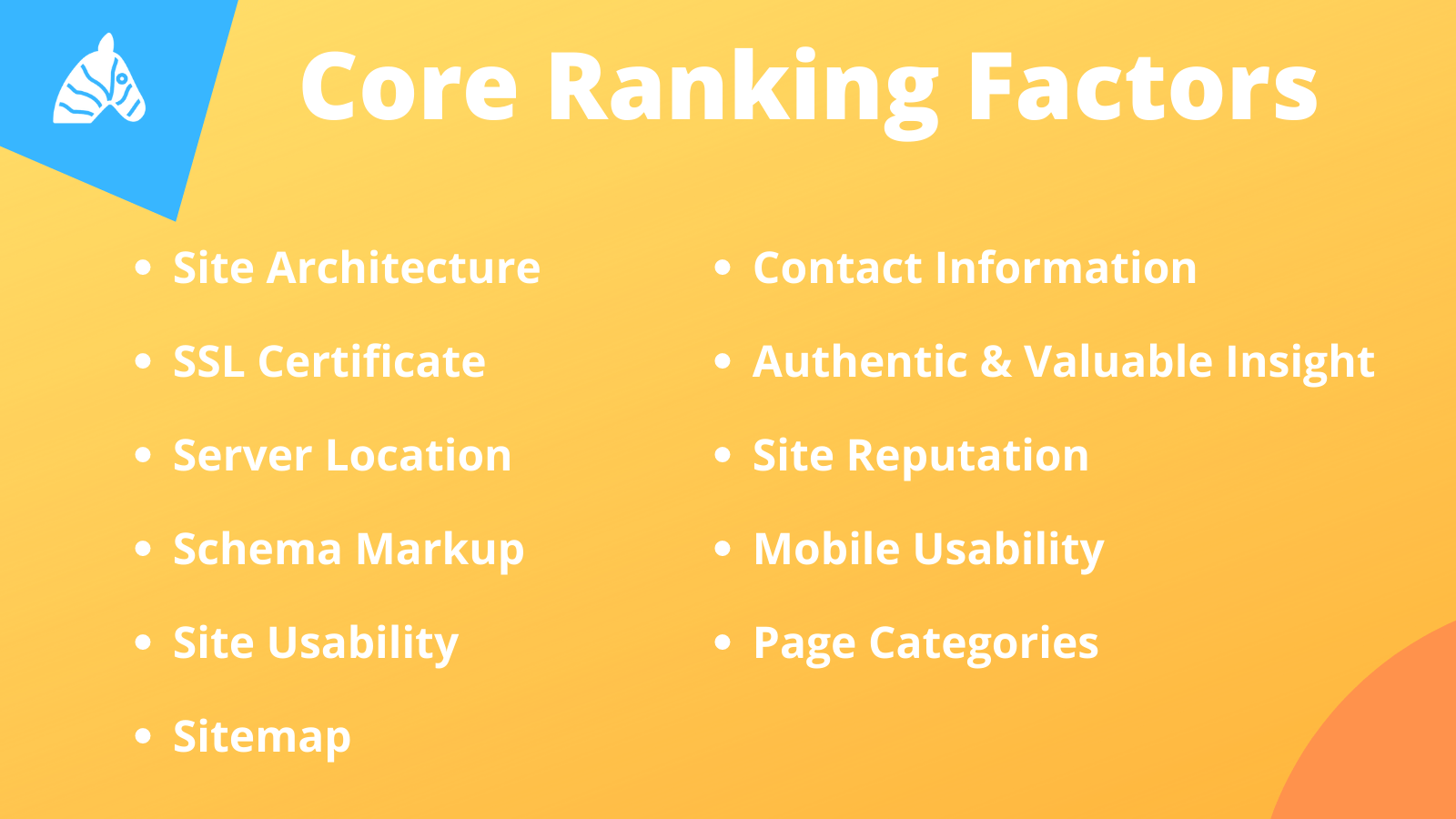
6. Sitemap
The presence of an accessible sitemap is a search engine ranking factor. Sitemaps help search engines to index your site structure and pages more thoroughly and efficiently, improving organic search visibility.
7. Contact Information
Google’s Quality Rater Guidelines states that the search engine giant favours sites with an appropriate amount of contact information available. Having your contact information on your website can significantly improve the trustworthiness of your business, website and brand for both search engines and users.
8. Authentic & Valuable Insight
Overall, the information and input that your site provides will be a search ranking factor. Google explicitly talks about rewarding sites that are unique, valuable and provide insight into topics users want to know about. Google will continue to disregard websites that don’t bring anything useful to the table.
9. Site Reputation
How your site is perceived off-site will contribute to the search engine and Google ranking factors. A site’s reviews on crowdsource review platforms like Google My Business, Yelp and TripAdvisor play an essential role in earning trustworthy and legitimacy for Google’s search algorithm.
10. Mobile Usability
Mobile usability is one of the primary Google ranking factors for a website to perform well in mobile search. Mobile search is only going to become more popular as more users rely on their phones for everyday tasks. A huge factor in user experience, mobile usability is a sure Google ranking factor in 2022. Google has clearly stated the importance of mobile usability for search engine rankings: “As more people use mobile devices to access the internet, our algorithms have to adapt to these usage patterns.”
11. Page Categories
Many marketers believe that pages that appear in the relevant categories can benefit from ranking boosts. Google’s patent on category matching describes a practice that matches search terms to a page’s content, as well as a page’s category; determining a category relevance score that may impact rankings.
Domain-Level SEO Ranking Factors
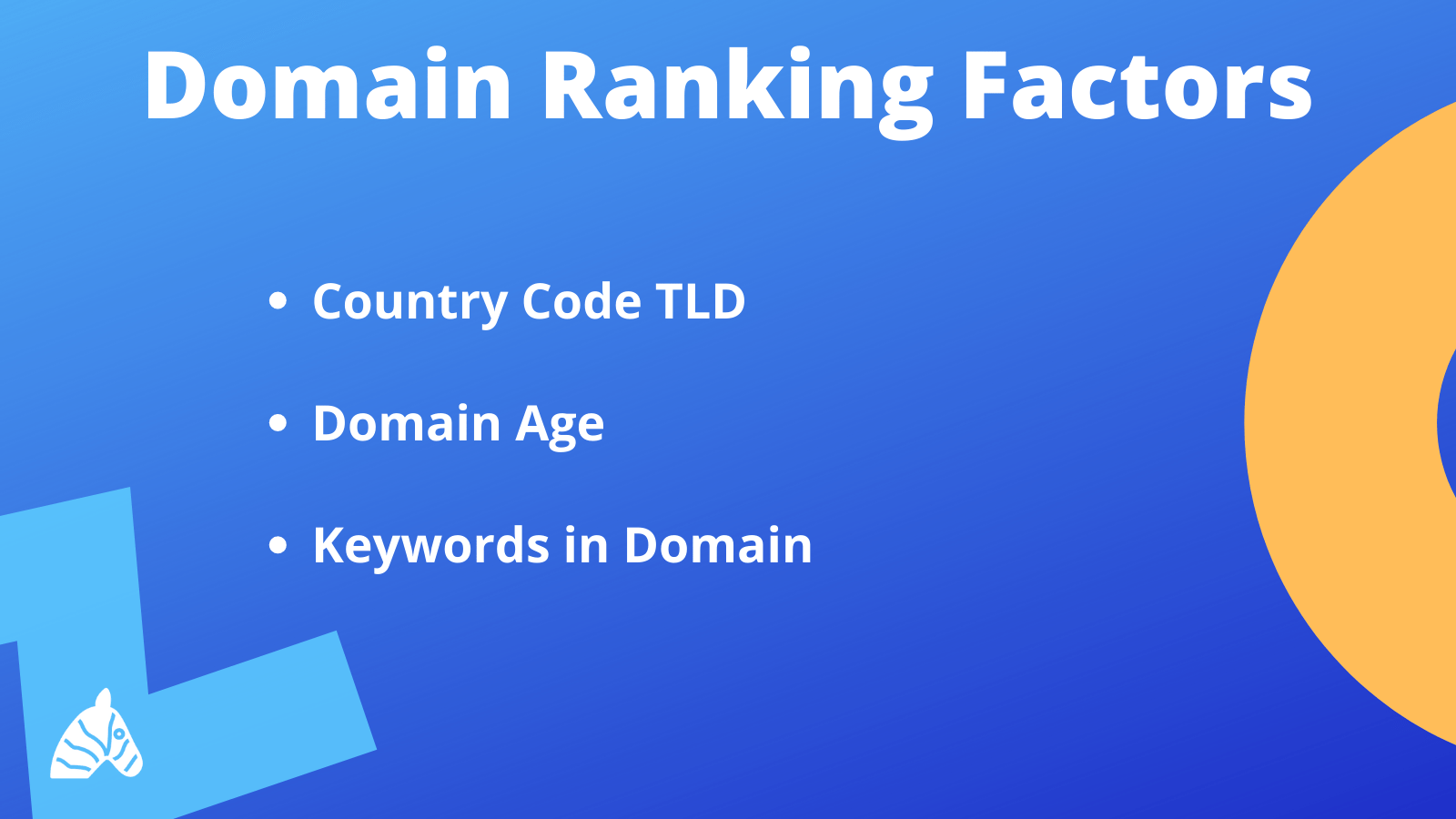
12. Country Code TLD
A country-code top-level domain (ccTLD) is a domain that uses an extension to relate a website back to a specific country or region. For example, .au is used for Australia, .nz for New Zealand, .uk for the United Kingdom. Google’s Search Console states that ccTLDs provide strong signals to both users and search engines that a site is explicitly intended for a certain country and will, therefore, be considered as a search ranking factor.
13. Domain Age
Whether or not domain age is a direct Google ranking factor has long been a discussion within the SEO community. The fact of the matter is, Google have stated that the age of a website is not a ranking factor alone. However, an abundance of studies conducted have deduced that an older, more established domain is a lot easier to rank than a brand new, fresh website. Therefore, domain age will somewhat come into play for search engine rankings; however, it is not the be-and-end-all of ranking a website.
14. Keywords in Domain
Using keywords in your domain certainly won’t provide you with that instant boost that it would a few years ago, but studies suggest that Google still uses keywords in domains as a very weak relevancy signal. Moreover, while exact match domains (EMDs) used to provide sure rankings, today, Google’s algorithm has shifted to reduce the amount of low-quality exact match domains in search results.
On-Page SEO Ranking Factors
The way and nature that each page is optimised will have a notable impact on its ability to rank, and how it will rank in the search engine results. While the most significant on-page ranking factor is content, there are a number of other very significant ranking signals on each page, including:
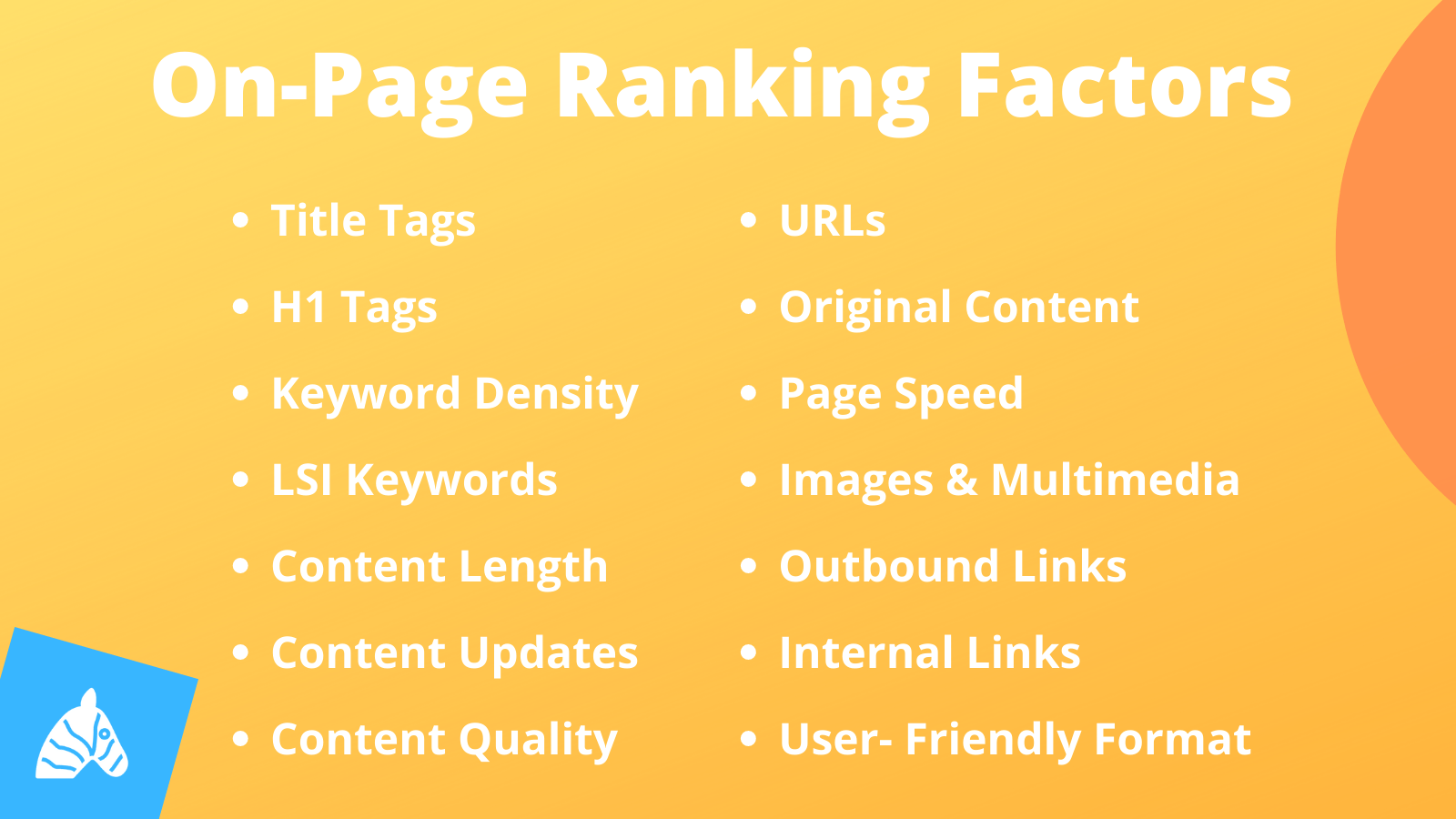
15. Title Tags
Page titles are one of Google’s strongest relevancy signals. Only second to the content itself, title tags need to be well-optimised to ensure the search engines are receiving the correct signals. Keywords need to be in the title tag, preferably at the beginning of the title. According to marketing company Moz, title tags that start with a keyword tend to perform better than titles with keywords at the end of the tag.
16. H1 Tags
Header tags are smaller title tags. They also send necessary relevancy signals to search engines and should be optimised. Keywords need to appear in H1 tags frequently. H2 and H3 tags will also work as relevancy signals and are considered to be Google ranking factors – having your keyword appear as a subheading can undoubtedly work in your favour (as long as they aren’t too stuffed).
17. Keyword Density
In 2022, keyword density is still significant for relevancy and helping search engines to determine the purpose of a webpage. Having a keyword appear more than any other phrase on a page will provide the right signals to search engines. However, going overboard with keyword density will only harm your organic visibility.
18. LSI Keywords
Latent semantic indexing keywords or LSI keywords help search engines to determine the meaning from words that have more than one meaning. LSI is a system to decipher the context of how a particular keyword is used. Studies suggest that the presence and absence of LSI contribute to the ranking of content; however, it has never been confirmed by Google that they rely on an LSI system.
19. Content-Length
Content length definitely plays a role in search engine ranking factors. The average page one result in Google is almost 2,000 words. Lengthy content can cover more breadth and are preferred by search engines over shorter, superficial articles.
20. Content Updates
How frequently your content is created, updated, and republished will influence search engine rankings. Google favours websites that regularly update pages with fresh content, images, and new information. In fact, content creation improves indexation rates by more than 434%. And updating existing content can increase organic traffic by up to 111.3%.
Google’s Caffeine update strives to give people more live search results, i.e. to let them find new relevant information faster. “Caffeine provides 50% fresher results for web searches than our last index, and it’s the largest collection of web content we’ve offered. “- Google
21. Content Quality
The quality of the content a website puts out is arguably one of the most important and top SEO ranking factors in 2022. As Google’s ranking algorithm becomes more sophisticated, the quality of the content it seeks increases. Search engines evaluate how useful and relevant content is, spelling and grammar of content, the reading level and whether it cites references. According to Google’s Quality Rater Guidelines, helpful supplementary content is a particularly valuable indicator of a page’s quality.

“Creating compelling and useful content will likely influence your website more than any of the other factors discussed here. Users know good content when they see it and will likely want to direct other users to it.” – Google: Search Engine Optimization (SEO) Starter Guide
22. URL Structure
The URL of each webpage will account for several of Google’s ranking factors. Search engines will look at the keywords used in the URL, the URL length, the URL path, and the URL string. Search engines rely on URLs for relevancy, page purpose, and authority. Furthermore, Search engine Journal have noted that excessively long URLs can harm search visibility and rankings.
23. Original Content
Identical or even just very similar content on the same site can fall under duplicate content. Duplicate content is considered in Google’s algorithm and can negatively impact the visibility of a website. With proper implementation, Canonical tags prevent Google from considering pages as duplicate content – a critical ranking factor to consider.
Syndicated content refers to when content is scraped or copied from an indexed page. Google will not rank pages with syndicated, scraped, or stolen content well – in fact; copied content can land your website a hefty penalty in 2022.
24. Page Speed
Both Google and Bing use page speed as a search ranking factor in 2022. Search engine crawlers can determine page load speed based on page coding and file size. Page load speed is critical as users are continuously looking for content to browse quickly and efficiently – not optimising your page loading time can significantly impact both search visibility and conversion rates.
25. Images & Multimedia
Images enhance user experience and help to create an aesthetic appeal to webpages. Image optimisation helps to convey the image to search engines in code terms, to allow Google better understanding. Images on-page send search engines necessary relevancy signals through file names, alt text, titles, descriptions and image captions. Furthermore, images, videos, and other multimedia elements may act as a content quality signal to search engines.
26. Outbound Links
The links you have pointing outbound from a page will have an impact on search engine visibility. Having too many broken links on a page can signal an abandoned or neglected website. Affiliate links may undergo analysis as while they won’t necessarily negatively impact search rankings; too many can associate your site with a “thin affiliate” scheming. Furthermore, irrelevant outbound links or too many links, in general, can decrease the quality of a webpage in the eyes of search engines.
27. Internal Links
Internal links play into the structuring and navigational paths of your website – they certainly help to improve the quality and relevancy of a page. Internal links help users and search engines to navigate a website and spread link equity around sites while establishing a content hierarchy for search engines to better understand the value you place on your content.
“The context we pick up from internal linking is really important to us… with that kind of the anchor text, that text around the links that you’re giving to those blog posts within your content. That’s really important to us.” – John Mueller, Google
28. User-Friendly Formatting
Google looks at the layout and formatting of each page when determining its value. The Google Quality Guidelines document states that “the page layout on highest quality pages makes the main content immediately visible”. Structuring your content and pages for users to navigate easily can go a long way in increasing the search visibility of your site and keeping users on your website. Furthermore, Google has made it clear that they intend to penalise all sorts of pages with distracting advertising.
Off-Page Ranking Factors
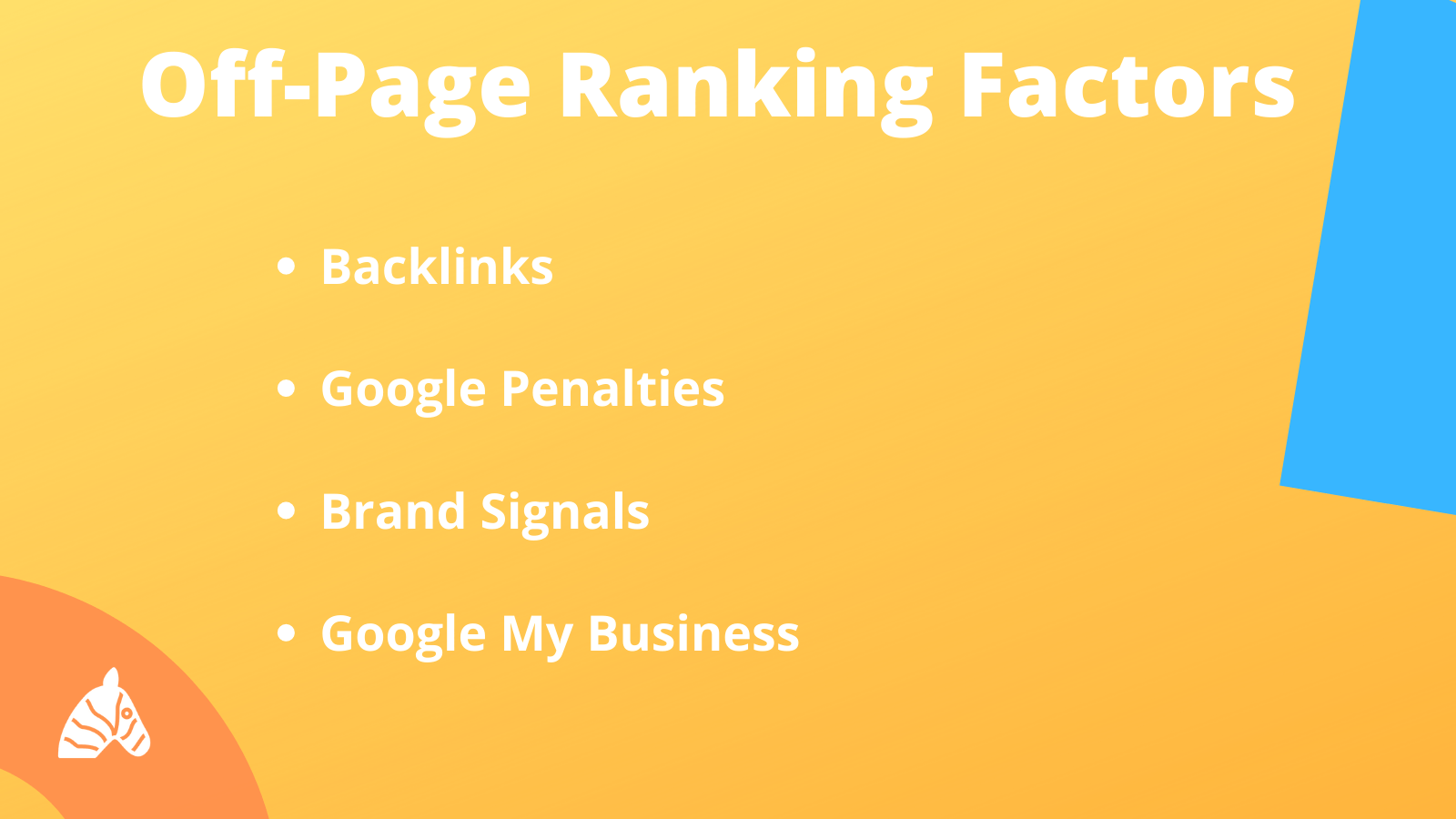
29. Backlinks
Unsurprisingly, backlinks are still one of the strongest relevancy signals used by Google to rank websites. When asking “how does Google rank websites in 2022?” backlinks are undoubtedly one of the first SEO ranking factors to consider. Over the years, we have seen significant changes in the way backlinks contribute to search ranking algorithm factors.
30. The number of links pointing to a website
Before the Google Penguin update, mass link building was a legitimate route to getting your website to rank well in search engine results. In 2012, the Penguin update was launched to rid SERPs of sites that were buying links, obtaining links through link farms, and acquiring high volumes of low-quality backlinks. If you have too many spammy links pointing to your website, this can negatively impact your search engine rankings. Furthermore, Google may also consider the number of root domains linking to a website.
31. The authority & relevance of the referring domain
Search engines may take into consideration the authority of the website that is linking to your site. Considering backlinks act as a “vote of confidence” for another website, the authority of the referring domain may prove how credible the source is. Backlink relevancy is really important. Google may look at the referring webpage to determine if the link is relevant to a site and its content. Google’s Webmaster Central Blog has stated the value of relevant and authoritative backlinks a number of times.
“Relevant, quality inbound links can affect your PageRank (one of many factors in our ranking algorithm).”
“We continued to protect the value of authoritative and relevant links as an important ranking signal for search.”
32. The anchor text used for the links
Link anchor text would be considered an important backlink search ranking factor. “The text of links is treated in a special way in our search engine.
…we associate it with the page the link points to. This has several advantages. …anchors often provide more accurate descriptions of web pages than the pages themselves.”
Over-optimised and exact match anchor text can also work against you. Google considers this to be spammy and unnatural behaviour and may decrease search engine visibility to those who engage in low-quality anchor linking practice.
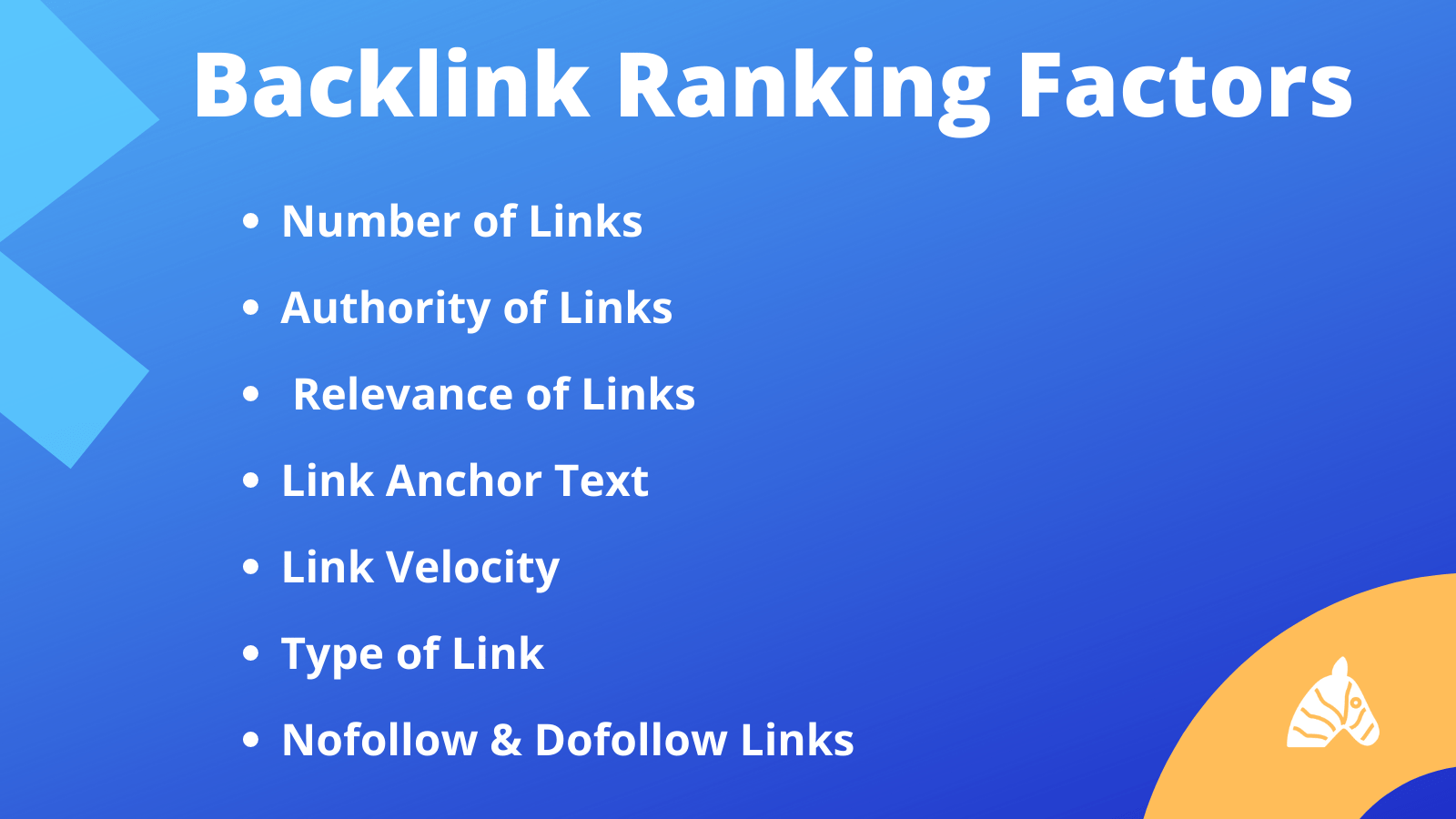
33. Link velocity
While not explicitly stated as a ranking factor, link velocity plays into the link building behaviours that Google analyses. If backlinks are coming in at a reasonably natural rate, it would appear a website is growing, and this provides positive signals to Google’s algorithm. If a site is attaining high volumes of links very quickly, this can signal link scheming behaviour and can have a negative impact on search engine rankings.
34. Nofollow links
The Nofollow attribute was introduced years ago in an effort to combat spammy links. Where previously, it was an instruction for search engines to disregard a link; today, Google relies on a hint-based system to determine their value. This means that while Nofollow links may not have the same value as Dofollow links, they still provide an important role in a well-balance backlink profile.
35. Link Type
Search engines will consider the type of link when determining how much value to place on it. For example, contextual links are much more valuable and favoured by Google than say, web directory links. Google may also deduce that your site is engaging in unnatural and spammy behaviour through link schemes, which can negatively impact rankings.
36. Google Manual Actions
Google penalties are manual actions taken by Google when they notice a website that has violated their Webmaster Guidelines. A manual action may be taken out for a number of reasons and will dampen your visibility in the search engine result pages for the violation. Unlike other search engine ranking factors, manual actions will come with a warning when applied to your website via Google Search Console.
37. Brand Signals
Brand signals are important factors for search engines. Brand mentions prove to Google that a business is legitimate and thriving, and not just another generic website. Extending and enhancing an online brand has become a crucial component for increasing the trustworthiness of a site – something Google takes very seriously in 2022.
38. Google My Business
Working in conjunction with Google Search and Google Maps, Google relies heavily on information from Google My Business to determine and rank local search results. Google My Business provides a myriad of signals including proximity, category, relevancy, and trust to search engines or local SERPs and Google Maps.
User Behaviour Factors
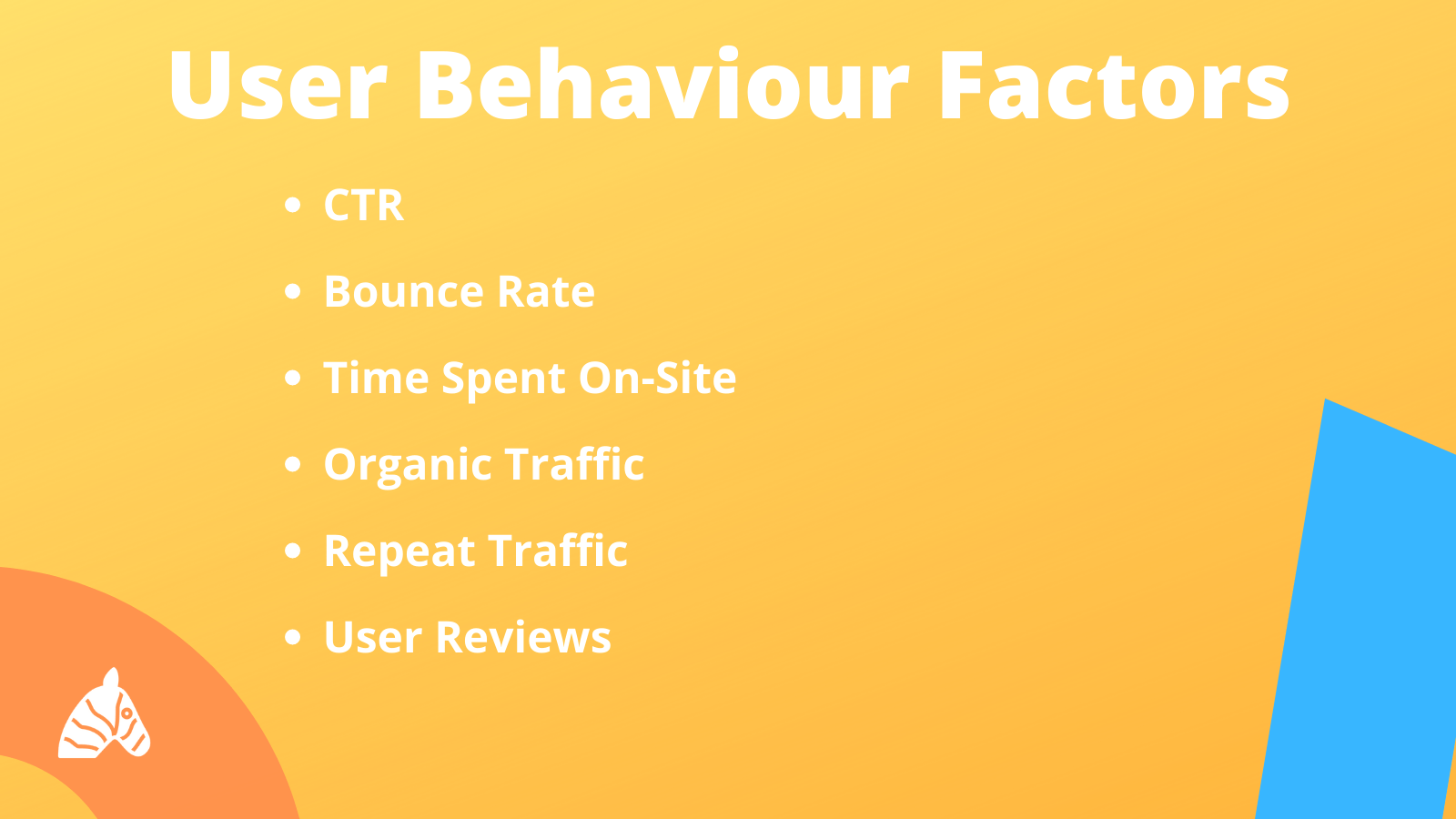
39. Click-Through Rate (CTR)
Click-through-rate (CTR) refers to the number of times users click through to websites from search engine results. While Google is yet to confirm CTR as a search ranking factor, we do believe it is a user interaction that is taken into consideration to evaluate page quality. Other user interactions that have been closely linked to search engine ranking factors include bounce rate, time spent on-site, direct traffic, and repeat traffic.
40. User Reviews
Users do play an essential role in the way Google ranks webpages. We know that online user reviews (particularly with Google My Business) can go a long way in increasing a website’s trust, authority, and legitimacy. Whether or not this falls under a direct ranking factor, we don’t know. However, multiple case studies prove that positive user reviews are considerable contributors to a high-quality website ranking and performing well.
Social Ranking Factors
According to Google, social signals are not a direct ranking factor, and social media sites are treated just like any other website. However, it is regularly proven that positive social signals can impact search engine rankings.
41. Social Signals
According to Searchmetrics, multiple case studies have proven the importance of social signals on the way a website performs in SERPs. “The correlation between social signals and ranking position is extremely high, and the number of social signals per landing page has remained constant when compared to the values from last year’s whitepaper. … The top-ranked websites in Google’s rankings display vastly more social signals than all other pages.”
While we can’t talk about all the Google ranking factors from social signals, we do feel we should mention that social media and search engine rankings has a lot to do with correlation, not causation. Social signals can certainly support other relevant SEO ranking factors, but they are not going to improve search engine rankings alone.
Search Ranking Algorithm Nuances
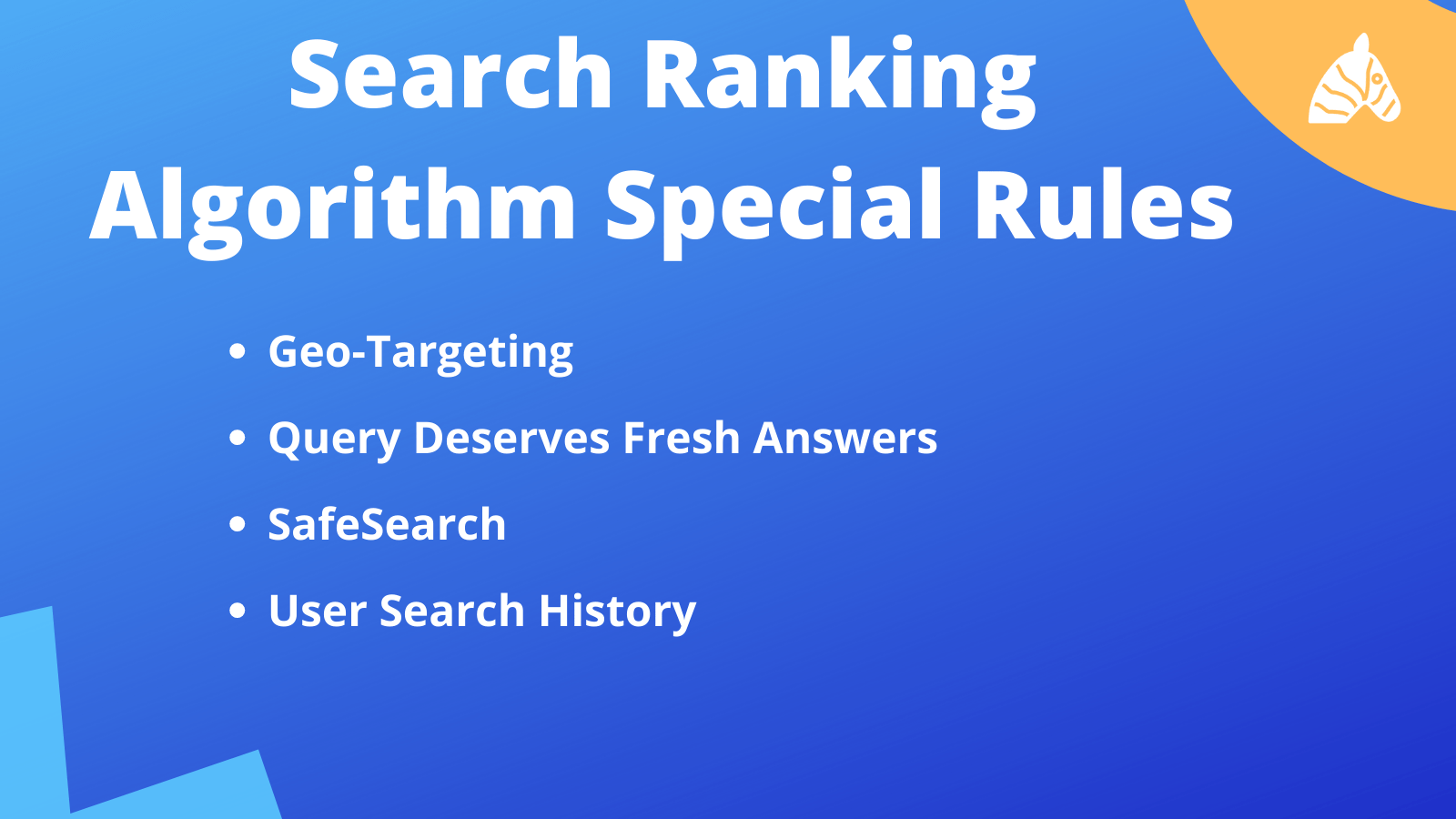
42. Geo-Targeting
Geo-targeting refers to how businesses are able to target customers that are in their local area in organic search. Google’s search engine relies on geographical locations of users to determine which results to show when they are locally relevant. For example, when a user types in “query + near me”, Google will use the geographical location of where the search took place to determine which websites to display in search results.
43. Query Deserves Fresh Answers
While Google does not explicitly favour fresh content, there is certainly merit in believing that the Google update back in 2011 is still relevant. Query Deserves Freshness is a mathematical model initially developed by Google to determine when users want new information and when they don’t. For the categories that “deserve” freshness, Google may index and rank this content faster. These categories include recent events and hot topics, regularly recurring events, and information that changes often.
44. Safe Search
SafeSearch is a feature of Google Search and Images that acts as a filter of inappropriate and potentially offensive content online. A tool that can be turned on through Google search; this is an important ranking factor that will impact which results appear in SERPs and when.
45. User Search History
While we can’t be 100% sure on how Google uses it for search, we do understand that Google collects a lot of data from users to better their search experience. A user’s recent search history and search behaviour may impact search engine rankings, and therefore, likely contributes as a Google search engine ranking factor.
Wrapping it Up
Well, there you go – there’s our analysis on the top SEO ranking factors in 2022 and the many speculated search engine ranking factors of 2022. There’s no way Google will ever disclose their entire ranking algorithm. However, we believe that with strategic A/B testing and following their webmaster guidelines, many of these factors can be considered when trying to improve the search engine rankings of a website.
While we can spend all of this time speculating and debating which Google ranking factors are real and which are myths, we genuinely believe that the focus in 2022 should be optimising sites for quality. Google’s core mission is to “organise the world’s information and make it universally accessible and useful”; if you want to rank well, you can start by making your website and content informative, valuable, authentic and useful.
No idea where to start? Speak with an SEO Agency in Sydney that can guide you with expert SEO services and SEO consulting.






